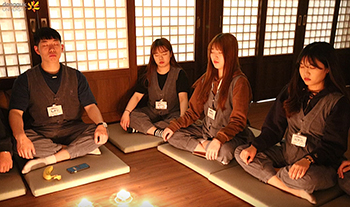
Recently, more and more universities are having their membership training (MT) at Buddhist temples instead of the usual resorts or training centers. This so-called “temple -stay” MT culture has risen as a novel and unique solution to the common problems regarding the infamous MT culture, such as heavy drinking and enforced hierarchy among students. The temple-stay MTs were initiated and encouraged by the South Korea Buddhist Culture Corporation (SKBCC) as a way for students to experience Korean Buddhism, as well as the life of Buddhist practitioners at traditional temples. This month, the SKBCC is holding templestay MTs under the topic of “Youth made by the Youths” to encourage young visitors to participate in the programs. Temple-stay MT is already a trend among several colleges. Just this month, history majors of Hankuk University of Foreign Studies (HUFS) visited Beopjusa, Seoul National University’s Department of Philosophy students visited the Bongsunsa, and students of Buddhist Studies from Dongguk University made their stay in Myogaksa. Many other universities, including Korea National Sport University, are also scheduled to visit traditional temples for their MTs. The popularity of temple-stay MTs is rising due to its intentions to alleviate the previous violent and dangerous MT culture. So far, most freshmen welcome parties, orientation training (OT) and MTs are accompanied by alcohol in a pressured atmosphere with colleagues to “bond” with each other inevitably followed by a fair share of consequences. Last year, a freshman at Keimyung University lost her life from choking in her sleep at a MT due to over drinking. This year, Yonsei University students denounced the enforced hierarchy culture at their OT, where freshman had to shout out an FM (Field Manual) repeatedly until the break of dawn according to the orders of older colleagues. Violence and abusive language were used when the FM was not done to the seniors’ satisfaction. Also, Korea University even had ambulances on call to prepare for potential accidents. Many believe that temple-stay MTs, where peace and nature are emphasized as main values, is a way to put a stop to such tragic accidents. “Temple-stay will become a replacement for fixing the previous MT culture followed by various drinking accidents and hopefully improve the general campus culture overall,” said Buddhist Monk Soo-am, the head of Cultural Corps of Korean Buddhism. “Through temple stay, I hope that young students will be able to earn the time to stop their source of trouble and seek their ‘true ego.’” The main programs of temple-stay MTs include temple tour, cham-seon (meditation), da-seon (tea ceremony), balwoogongyang (monastic meal), yebool (praying), and ingyeong (wood block printing from the Tripitaka Koreana which is a Korean collection of Buddhist scriptures), making Buddhist-style meals and making paper lanterns in the shape of a lotus flower. There are three types of temple-stay MT according to its length: one-day program, experiential program, and recuperation program. The one-day program gives a chance to experience Korean traditional culture of Buddhism in a short time. The experiential program is a one-night twoday program that is provided only on weekends. It has more activities such as 108 prostrations and monastic formal meal. The recuperation program is a free-style program that lets visitors to manage the rest of their time at the temple by their own will once after attending the yebul (Buddhist ceremony) in the morning and evening. During the program, participants were asked to follow temple etiquettes. Participants had to speak quietly, dress conservatively, and refrain from all physical contact with the opposite gender. Also, general manners in the Buddha Hall like avoiding passing in front of others who are making prostrations or praying, passing with one’s palms together, and avoiding the center of the hall reserved for monks in front of the Buddha were requested. “I believe that the meditation program truly helps in renouncing one’s worldly desires and concentration on the ego,” said Park So-mi, a sophomore majoring in Buddhist Studies at Dongguk University. “With no alcohol but a calm and reverent atmosphere, I feel a much stronger bond with my colleagues by just talking and taking walks in the nature,” said Kim Yeji, a freshman majoring in history at HUFS. “The established MT culture with alcohol and recreation is fun, but I think temple-stay MT is a new experience that differs from the conventional culture. I hope this templestay culture can settle in other majors and become universal.”

